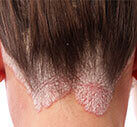What are skin inflammatory diseases?
Inflammatory skin diseases are the most common concern addressed by dermatologists. They range from occasional rashes that itch and are inflamed to chronic (long lasting) conditions such as acne, eczema, seborrheic dermatitis and psoriasis. Only your doctor can provide you with a proper diagnosis and then can discuss the personalized treatment that is right for you.
Understanding skin inflammatory diseases
When injured or altered, the skin sends signals to repair the breach in the barrier via releasing inflammatory chemicals that permeate the skin. Inflammation (redness, pain) on the skin surface is the body’s healing response, bringing more nourishment to the site of inflammation. Inflammation is part of the body’s immune response, without it, we can’t heal. In the case of skin inflammatory diseases, the body’s inflammation response can actually damage the skin, resulting in acne, eczema & psoriasis.
Acne
Emerging scientific data suggests that inflammation occurs at all stages of acne lesion development. Inflammation may precede acne lesion formation and may serve as the trigger that leads to hair follicles becoming blocked and then rupture into acne lesions. Both acne & psoriasis involve excessively rapid turnover of skin cells lining the hair follicles on the skin.

Eczema

Patients with eczema have a weak outer skin barrier, creating “holes” in the skin that leave it unprotected from moisture loss and irritants that can cause inflammation, which leads to scaling and itching.
Psoriasis
Psoriasis is a chronic (long lasting) skin disease characterized by scaling and inflammation. In healthy skin, skin cells grow deep in the skin and slowly rise to the surface, usually every 23 to 30 days. With psoriasis, this process speeds up and happens in just a few days. These skin cells then pile up on the skins surface, causing thick, red skin patches with silvery scales to form.

